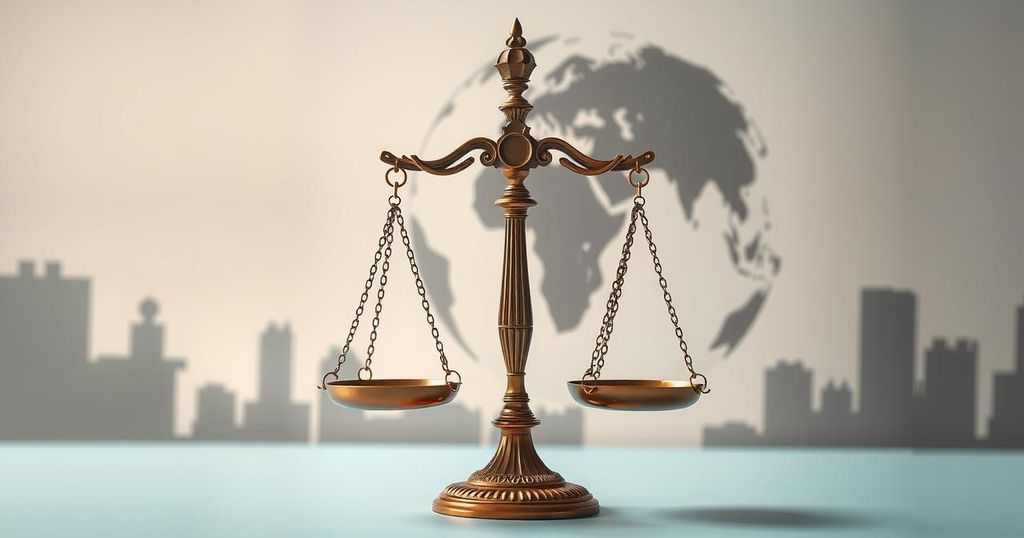Aidarus al-Zoubaidi, Vice-President of Yemen’s UN-backed government, encourages the West to target the Tehran-backed Houthi leadership while Iran is perceived as weakened. He advocates for a coordinated military strategy involving ground forces and heightened US action against the Houthis, criticizing previous ineffective approaches. Zoubaidi expresses concern over the Houthis’ operational strength and lack of decisive US policy under the Biden administration.
The Vice-President of the UN-backed Yemeni government in Aden, Aidarus al-Zoubaidi, urged Western nations to capitalize on Iran’s current vulnerabilities to target the Houthi leadership in Yemen. With Iran’s influence reportedly weakened in Lebanon, Syria, and Gaza, Zoubaidi emphasized the significance of countering the Houthis while they remain a crucial part of Iran’s proxy forces, urging a collaborative military strategy that integrates ground forces with Western airstrikes.
During his attendance at the World Economic Forum in Davos, Zoubaidi advocated for the new US administration to classify the Houthis as a foreign terrorist organization, commending former President Donald Trump’s assertive leadership. His statements imply that the newly formed Presidential Leadership Council is seeking a coordinated offensive against the Houthis, potentially involving ground troops.
Zoubaidi expressed his belief that Iran is unlikely to abandon its support for the Houthis, stressing the importance of intensifying efforts against them. He offered the Aden government’s intelligence assistance to all forces engaging the Houthis, hinting at possible collaborations with various nations, including Israel, while lamenting the ineffectiveness of prior US and UK strikes that did not target Houthi leadership directly.
The Houthis assert that their latest attacks on commercial shipping in the Red Sea were designed to demonstrate solidarity with Palestinians, with their leader explicitly stating that they would refrain from attacking vessels linked to the US or UK during a ceasefire in Gaza. Zoubaidi, however, pointed out that the Houthi social structure differs significantly from that of Hezbollah and Hamas, warranting a more comprehensive strategy.
He criticized the Biden administration for a perceived lack of decisiveness regarding the Houthis, particularly in its decision to downgrade the group’s designation. Zoubaidi stated that this has provided the Houthis with an advantageous environment, enabling their activities. He further indicated a growing disillusionment with peace diplomacy as a strategy.
Zoubaidi’s stance reflects a push towards a more aggressive military response, signaling the STC’s alignment with the United Arab Emirates while raising questions about whether this approach has the support of Saudi Arabia or the current US foreign policy team.
The current political landscape in Yemen is shaped by the ongoing conflict involving the Houthi movement and various factions within Yemen, notably the UN-backed government. The Houthis, originally from northern Yemen, have controlled the capital, Sana’a, since 2014 and have positioned themselves as a critical component of Iran’s regional influence. The broader context includes Iran’s fluctuating power dynamics in the Middle East, particularly in response to events in Lebanon, Syria, and Gaza, which have implications for the Houthis’ capacity to operate while the Biden administration reassesses its strategic posture in the region.
In conclusion, Aidarus al-Zoubaidi’s statements emphasize the opportunity for Western governments to counter the Houthis amid perceived Iranian weaknesses. His call for a coordinated military strategy underscores the growing urgency to adapt to the evolving conflict dynamics in Yemen. The potential for increased military collaboration, alongside criticism of US policy, highlights a shift from diplomatic approaches, raising significant implications for future engagements in the region.
Original Source: www.theguardian.com






